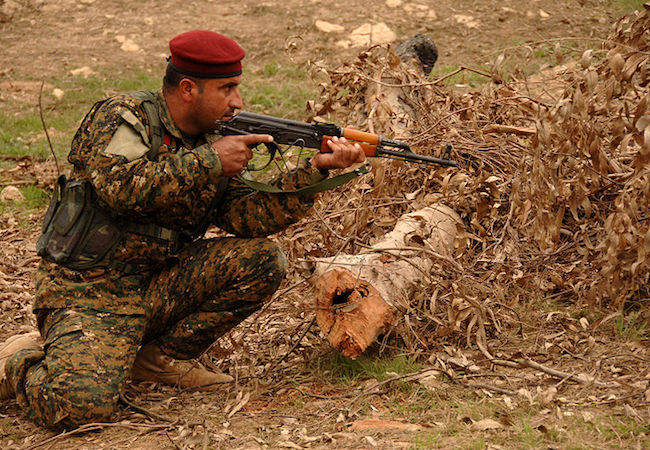The next crucial question: Is it time to discuss an independent Kurdistan

By Abdul Manan
An extended stroll off Lake Geneva leads up to a modest Kebab shop. In the company of flamboyant culinary establishments the shop stands out for its minimalistic appearance. While waiting for a Doner Kebab one evening, my eyes fixated on a photograph decorating the otherwise bland wall. In it was an upright, clean shaven man dressed in military attire sporting the Kurdish emblem. “The world better not forget us, again.” said the chef as he handed me the aromatic Doner.
In the far, uncertain horizon of Iraq and Syria’s post ISIS consolidation, the question of an independent Kurdistan looms like a brewing tornado.
History of the Kurds is filled with achievements, sacrifices, betrayals, and most recently, victories. With a language and lineage distinct from the Arabs, Kurds are a protracted community that has undergone serious persecution for their aspiration of a separate state. The cringe worthy acts of collective persecution unleashed upon the Kurds in the recent past by Iraq, Turkey, Syria and Iran speak to the political ostracization the Kurds have been subject to. Even after being gassed by Saddam Hussein in the infamous Halabja massacre, wherein an entire village froze to a grotesque death due to the use of chemical weapons, the closest Kurds came to an independent state was an autonomous region established within Iraq. The relevance of the Kurdish cause went out of vogue primarily due to a lack of political and geostrategic leverage. Until now.
The waning resonance of the Kurdish cause in international circles has undergone serious resurrection – Iraqi and Syrian Kurds are serious stakeholders in the ongoing shift in power relations of the middle east. The current military and political leverage that Kurdish militias preside over is simply too large, too sensitive to ignore. The new regional order that will emerge out of the current conflict in the middle east will have to negotiate with Kurdish aspiration(s).
Kurds are at the heart of two decisive offensives being undertaken by anti IS coalitions – liberating Mosul in Iraq and Raqqa in Syria. The Kurds, Iraqi and Syrian, have proven to be most effective on ground allies of the United States and the Iraqi Army in the fight against the Islamic State. The complexity of sectarian divides within Iraq is reflective in the measures Iraqi authorities have undertaken as they prepare to liberate Mosul from the Islamic State. Sectarian tensions in Iraq are expected to rise after the Army retakes Mosul, for a Shiite majority army will come in direct contact with an estranged, alienated Sunni majority. Iraqi Kurds have been persuaded to remain on the outskirts of Mosul to minimize their liaison with the population. Although majority of Kurds are also Sunni, the Kurdish separatist sentiment wreaks of another deeply held sectarian divide. Meanwhile, Iraqi Kurds have also cleared IS militants from Bashiqa, a town northeast of Mosul. It is fair to say that Iraqi Kurds are as much active militarily as the Iraqi Army, if not more.
In Syria, involvement of the Kurds cannot be stressed enough The Syrian Kurdish militia, called the YPG, forms the backbone of the coalition fighting Islamic State in Syria. In the recently launched offensive to retake Raqqa, the de facto capital of Islamic State, the YPG is a crucial force on the side of the coalition. YPG has repeatedly regained numerous pockets of territory in Syria from the clasps of the Islamic State. In the Operation Euphrates Anger, YPG will not be penetrating deep into Raqqa, should everything go as anticipated. It will surely maintain a strong presence at the outskirts, providing depth to the advancing SDF forces.
Peshmerga (Iraqi Kurdish Army) and YPG (Syrian Kurdish Militia) both have displayed impeccable discipline in fighting the Islamic State, coordinated almost flawlessly with the United States, SDF, Iraqi authorities, and have produced formidable results. The Kurds have done everything expected of a well meaning friend. But, the expectations of the Kurds vis a vis future prospects of a state are yet to be discussed.
While the majority of discourse about post conflict rebuilding in Iraq and Syria revolves around restablishing institutions, the Kurdish question in the context of their increased military influence in the region has not been a subject of much discussion. But, it should.
In the collective conscience of the Kurdish people there exists a stark sense of betrayal on the part of the western powers, who while redrawing the borders of the middle east sacrificed Kurdistan. Consequently, in a region charged with ethnic loyalties, a solemn people was chopped into three or even four diasporas. The Kurds have exercised little leverage since then to amount to any considerable action. In the newly emerging sub regional order however, they possess the training, arms, and influence to turn this chaos, which they’re so desperately trying to end, into their war of much awaited independence.
If another bloody conflict war is to be averted, Iraq, Syria, Turkey, Iran, and the United States have to seriously address the Kurdish question when conceptualizing a post IS Iraq and Syria. A detailed discussion about the place of the Kurds in the post IS power sharing equation, although may open a new can of worms, will lay the necessary groundwork for a lasting solution. In the current institutional vacuum in the middle east, if Kurds are not kept in the loop of decision making, it may trigger an entirely new insurgency. In the event of a Kurdish insurgency, the stability that had been lost to Islamic State, then somehow, somewhat regained by defeating them, will have been lost again.
Abdul Manan is an International Affairs and Religious Studies major studying at Lafayette College, Pennsylvania.




